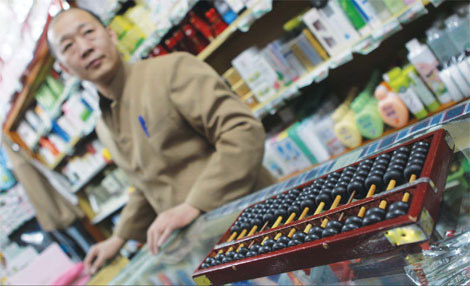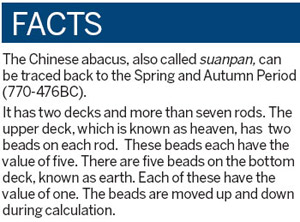Revival of ancient counting device
Updated: 2010-12-31 11:08
By Liu Lu (China Daily European Weekly)
 |
|
Beijing shop clerk Gao Shunxiang has been using an abacus at work for 28 years. He could end up being part of the last generation of abacus users in China. Cui Meng / China Daily |
The abacus faces extinction but some are trying to revive the use of this ancient counting device
Shop clerk Gao Shunxiang's flying fingers are counting beads and in just a few seconds tells his customer, an elderly lady, that her two tubes of skin lotion add up to 47 yuan (5 euros). The customer's chubby grandson stares at the counting device in fascination. He stands on his tiptoes and grabs the abacus and shakes it like a rattle until Gao takes it off him. Unlike his mother, grandmother and generations of Chinese before him, he had never seen any one use an abacus before.
Gao, 44, has used a suanpan, ever since he began working as a salesclerk in an old Beijing grocery in 1983. For nearly three decades his co-workers have been doing the same.
"A skilled abacus user can do sums and outpace electronic calculators," Gao says.
He also adds that his "wooden calculator" is cheaper and more eco-friendly than any other high-tech device.
But Gao and his abacus-using coworkers are part of a dying breed.
Up until the 1990s, abacus lessons were compulsory in Chinese primary schools until they became a selective subject.
In 2001, the Ministry of Education removed all abacus teaching from the mathematics curriculum and today's young generation have lost touch with this age-old, yet useful tradition.
Advocates say abacus training can make young people smarter.
"Actually, the process of learning to use an abacus is very beneficial in developing a child's intelligence," says Chen Feiyan, who is a lecturer in the department of physics at Zhejiang University in Hangzhou of East China's Zhejiang province.
Earlier this year, Chen and her colleagues surveyed 200 elementary school students and discovered that those pupils who knew how to use an abacus scored better test results.
"Practicing using the abacus has helped make mathematics more understandable to students by visualizing abstract matters with physical objects," Chen says.
"Actually, learning the abacus is a fun exercise, which can be applied to reinforce the coordination capability of a child's hands, eyes and brain, as well as improving one's agility and reaction time.
"All will ultimately boost a person's brain function."
Despite the lack of abacus use in mainstream modern society, Chen says a growing number of Chinese private schools are offering abacus lessons.
The Shenmo Group, which is a China-based international group, specializing in early childhood education, is one such institution.
The company says it is planning to introduce abacus lessons to Europe.
"Abacus lessons are best suited to children aged from four to 12," says Tang Lei, a teacher with Shenmo Group in Beijing.
"For children, the abacus is not only a learning tool, but also an interesting toy, which can help them cultivate a strong interest in learning mathematics, and at the same time improve their concentration and observation abilities."
Tang says more and more parents have accepted this teaching method in recent years.
And he says a skilled abacus user can even do high-level mental arithmetic without actually touching a real abacus.
The method involves making a mental picture of an abacus in one's mind, moving the beads and achieving the same result.
Almost any child can master this special ability after months of intensive training.
Tang says Shenmo plans to open abacus training schools in the UK and France in three years. "Several years ago, some nursing homes in Sweden began to encourage senior citizens to exercise their brains by practicing Chinese abacus, proving there is a market potential for abacus education overseas," Tang says.
The Chinese abacus is considered the first of its kind when it was first developed 2,500 years ago, and different forms of the counting device evolved in other countries.
Its cultural value is not lost in China and in 2008, China's State Council officially listed the abacus as a national intangible cultural heritage.
The Chinese Abacus and Mental Calculation Development Association is one organization dedicated to conserving its tradition.
"The Chinese abacus is one of the greatest contributions that China made to world civilization, so we should make good use of it to enrich our teaching method rather than abandon it," says Dr Liu Qinying, the deputy secretary-general of the group.
"The abacus was an essential home computing tool 20 years ago, but most people today only buy it as a decorative item meant to be placed on a mantle without an actual use."
She says that the ancient device is still an auspicious symbol of wealth in many homes because Chinese traders and businessmen have used it to count money for thousands of years.

In order to promote its use, Liu's association holds an international abacus competition every two years attracting many overseas contestants.
"Although abacus literacy is no longer a prerequisite for most jobs today, it should not fade out from people's lives,
"Instead, we should take good care of this centuries-old cultural heritage and tap into its usage scientifically, so as to benefit modern peoples' lives."
E-paper

Ear We Go
China and the world set to embrace the merciful, peaceful year of rabbit
Preview of the coming issue
Carrefour finds the going tough in China
Maid to Order
Specials

Mysteries written in blood
Historical records and Caucasian features of locals suggest link with Roman Empire.

Winning Charm
Coastal Yantai banks on little things that matter to grow

New rules to hit property market
The State Council launched a new round of measures to rein in property prices.
